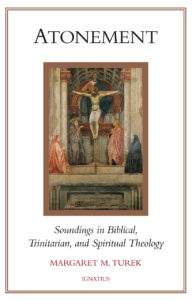Podcast: Play in new window | Download (Duration: 39:30 — 27.2MB) | Embed
Subscribe: Apple Podcasts | Spotify | Amazon Music | Android | Pandora | iHeartRadio | JioSaavn | Podchaser | Gaana | Podcast Index | Email | TuneIn | Deezer | Anghami | RSS | More

Introduction – Atonement: Soundings in Biblical, Trinitarian, and Spiritual Theology
Discerning Hearts presents a new series of conversations between Dr. Margaret Turek and Evan Collins about her book, “Atonement: Soundings in Biblical, Trinitarian, and Spiritual Theology.”
 You can pick up a copy of the book here:
You can pick up a copy of the book here:
An excerpt from the book:
It should be cause for concern, therefore, that a conspicuous characteristic of much of contemporary theology is the absence of efforts to explain the Cross event as a work of atonement. Despite the fact that the Church’s Scripture, doctrine, and worship all sanction the faith-conviction that Christ by his Passion and death atoned for sin, once for all (Heb 9:26),3 this understanding of the Cross event has largely fallen out of favor. Among theologians, one can detect an unmistakable reserve—even embarrassment—with regard to the idea. And things are not hugely different in the world of parish faith formation. On most occasions when the Scripture readings at Mass testify expressly to the atoning purpose of Christ’s Cross, the priest or deacon proves masterful in avoiding the subject—even on Good Friday, when the prophecy of the Suffering Servant (Is 53) is read as prelude to Saint John’s Passion account.We may assume that behind this pattern of avoidance is the view that the message of the Cross as atonement clashes with the sensibility of many today. Nonetheless, just as Christ had to challenge the expectations and mindsets of his interlocutors, so Christians may not sidestep the task of challenging and transforming the perspectives of their audiences.
Turek, Margaret. Atonement: Soundings in Biblical, Trinitarian, and Spiritual Theology (pp. 10-11). Ignatius Press. Kindle Edition.
From the book’s description:
“This book presents the chief insights concerning the mystery of atonement in the works of four theological guides: John Paul II, Joseph Ratzinger/Benedict XVI, Hans Urs von Balthasar, and Norbert Hoffmann.
The author argues for the central importance and perennial value of a theology of atonement, even as she explains the modern aversion to it. The book’s central aim is to deepen our understanding of the biblical claim that God shows himself to be love precisely by sending his Son as atonement. “In this is love: not that we loved God, but that he loved us and sent his Son as expiation for our sins” (1 Jn 4:10).
The book develops a compelling vision of atonement as a process that originates from and is engendered by God’s own power to love. This vision not only takes account of the gravity of sin and its consequences but also provides a clear illumination of the wholly gratuitous, radically forgiving, passionate and powerful nature of God’s redeeming love for mankind. Distinct from the majority of theological accounts of atonement, which focus almost exclusively on the role of Christ, this book highlights the role of God the Father in the atoning mission of the Son.”

